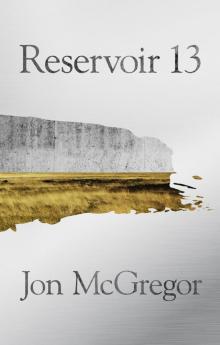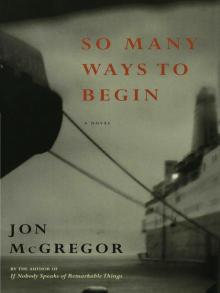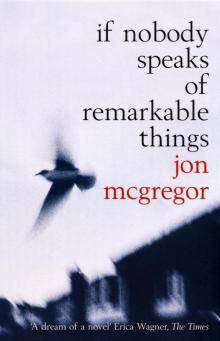- Home
- Jon McGregor
Reservoir 13 Page 3
Reservoir 13 Read online
Page 3
At the school the lights were seen on early in the hall. Preparations were being made for the Christmas assembly. Jones had cut holly and fir from the woods, and Mrs Simpson was on her knees arranging it around the nativity scene. Miss Carter asked Jones to hold the bottom of the ladder while she took some tinsel up. Ms French couldn’t help noticing, glancing across from her half-finished wall display of shepherds and cotton-wool sheep, that Miss Carter was wearing a skirt. Also that Jones was not keeping his eyes down. She didn’t like to interfere but she thought it best to ask Jones to put the chairs out instead. When Miss Carter looked down to see no one holding the ladder she stood very still, and looked at the wall in front of her, and tried not to think about how recently Jones had polished the floor. She found herself thinking about Tom Jackson’s father, Will, and about him not seeming the type to wander away from a ladder like that. She held on tight. There were carols in the church with candles and the smell of cut yew and holly. Olivia Hunter sang a solo verse of ‘Silent Night’. She was eight years old and blithely confident. Her voice trembled a little on all is calm, all is bright, and at the end of the verse she beamed as she waited for the congregation to join in. At the village hall the production of Jack and the Beanstalk was finally staged. The costumes and scenery had all been kept from the year before, and most people had been happy to keep the same parts. The hall was full on the night of the show. Lynsey Smith had shot up over the year, and was looking less boyish than when she’d been cast. But she climbed up the beanstalk with just the right recklessness, and when she disappeared into the curtained rafters Cathy Harris, playing Jack’s mother, did a good job of looking bereft. Afterwards the chairs were cleared and the bar opened and trays of mince pies brought out. Richard Clark was seen in the audience for the first time in years. He’d been staying with his mother for a few days. He hadn’t got there until his sisters had been and gone, which his mother was used to now, and he was out of the country before the year was through. He was a busy man. Some years she was glad to see him at all. He lived out of a suitcase, it seemed, and this was no way to live for as long as he had done. They didn’t really sit down and have a conversation the whole time he was there, and when he left for the airport she didn’t even know where he was headed. He was a consultant, was as much as she knew. There seemed to be a new lady friend but he hadn’t mentioned a name. When he was gone she changed the sheets on the bed and opened a window to air the room and the sound of church bells came into the house. They were holding another service to mark the year since the girl’s disappearance. There were no extra chairs this time, and no one left standing at the back of the church. Jane Hughes said many of the same things she had said the year before. And still we have no answers, and all we can do is wait. She closed her eyes and held out her hands and let the silence settle. The missing girl’s name was Rebecca, or Becky, or Bex. She had been thirteen at the time of her disappearance. She’d been wearing a white hooded top with a navy-blue body-warmer, black jeans, and canvas shoes. She would be taller than five feet now, and her hair may have altered in both style and colour. The investigation remained active, a police spokesperson confirmed. The girl’s mother was seen on the side of the moor, walking the same paths and tracks she’d always walked. There was more rain on the way, or worse. A cold wind blew shadows across the reservoirs and on the higher ground a flurry of thin snow whirled against the tops of the trees. The goldcrests fed busily deep in the branches of the churchyard yew.
2.
At midnight when the year turned there were fireworks going up from the towns beyond the valley but they were too far off for the sound to carry to the few who’d come out to watch. The dance at the village hall went ahead, and was enjoyed by those who attended. A year was long enough, they thought. The streets were quiet and there were no police now but in the sharp night air it still felt recent. Will Jackson was seen with the teacher from his son’s class at school. The snow came down thickly overnight and for a time it seemed the road might be closed. By noon the sun was out and the drains were gulping meltwater from the road. A blackbird inched under the hedge in Mrs Clark’s garden, poking around in the wet leaf litter for something to eat. In the eaves of the church the bats were folded deeply into hibernation and the air around them was still. There were heavy rains for a week that brought flooding down the river. Debris piled up against the footbridge by the tea rooms until the weight of it swept the footbridge away. After the storm the river keeper dragged out what was left and fenced the bridge off at either end. The river keeper worked for the Culshaw Estate, who owned the fishing rights, but there was always disagreement over who was responsible for the bridges and paths. The family who lived in Culshaw Hall were no longer Culshaws, and were generally felt to be out of their depth. It was a struggle to keep the building in one piece, never mind manage all the land. Most of their money went on the keepers, since shooting and fishing was all that brought in an income. The rest of it went on solicitors, to prove they had no obligation to pay for things the Culshaws once would have done. The sound of the reservoirs overtopping the dams for the first time in years was torrential and constant and swept through the valley. All month the church services were taken by visiting preachers and no one seemed to know where the vicar had gone. The churchwarden said she was on holiday, but this was understood not to mean that she’d gone away. The word stress was used, and when she came back no more was said. At the Hunter place there was a feeling of life being on hold. The bookings in the barn conversions had been cancelled for another year, and the place was quiet. Jess Hunter hadn’t become friends with the girl’s mother in the way she’d thought she might. It had become clear she wanted to stay around for the long term, even now her husband was mostly back in London, and Jess had tried to include her in family life. But perhaps having Sophie and Olivia around was difficult for her. They’d shared meals and sometimes a drink, but the woman was very closed. It was unclear how to respond. Jess prided herself on being a woman who knew how to get people to open up. Her daughters told her everything, which was more than could be said for her husband. He was away again this month, and Jess had only half an idea what for. Some high-level policy forum. Something about land management. The man was impossibly vague. She stood in the kitchen looking out across the courtyard towards the barn conversions. The girl’s mother was on her doorstep, smoking a cigarette. Jess wondered if she could see into the kitchen from there. In the village questions were being asked about how long she would stay. People wanted the girl found so this could all be over. She might have got into one of the caves that burrowed deep under the hill. She might have curled up in a corner and still be down there now.
On Shrove Tuesday Miss Carter organised a pancake race in the school playground, once Jones had swept the snow and put down grit. There was a disagreement about how often the runners were supposed to flip their pancakes, and some of the children became distressed. Lucy Williamson had to be taken home with a bruised foot. Jackson’s boys came down the road past the school and Simon asked Will if he wasn’t going to drop in there with a Valentine’s card. Will said he’d no idea what they were talking about and then told them they’d best keep quiet because there was nothing to it. It was nothing serious. If people start talking it’ll only complicate things with the boy’s mother, he said. It wasn’t clear when he’d started calling her the boy’s mother instead of the girlfriend, or Claire. Probably about the time she went back to her mum’s house. Which was meant to have been temporary but these things have a way of settling. His brothers were still laughing about his denials when they got down to the lower field and started hauling feed off the trailer. Will told them if they didn’t knock it off he’d tell Jackson about the red diesel. They told him he wouldn’t but they quietened down. The ewes gathered about as they tipped out the feed, knocking heavily into their legs. The brothers worked their way around, inspecting the fleeces and feet and arses and ears, and an easy concentration came suddenly over them as though there’d been no jok
ing at all. They handled the animals firmly, quickly, muttering commentary to each other, and if their mother had happened to pass in the lane she would have seen much of their father in the way they held themselves and the way their young bodies moved under the heavy sky. In the afternoon the slush froze glassily again and was covered with another layer of late-falling snow. The night was cold. In the morning on the far side of the river Les Thompson led his herd across the yard to the milking parlour while the sky was still thick above the trees. The air was soon steaming with the press of bodies, Les moving among them while they got themselves into line. He was a big man, and the cows shifted easily to let him through. Dawn was a way off yet and wet when it arrived. Jackson had a stroke and was taken to hospital and for weeks it was assumed he wouldn’t be coming home.
In the beech wood the foxes gave birth, earthed down in the dark and wet with pain, the blind cubs pressing against their mothers for warmth. The dog foxes went out fetching food. The primroses yellowed up in the woods and along the road. The reservoirs were a gleaming silver-grey, scuffed by the wind and lapping against the breakwater shores. In the evening a single runner came silently down the moor, steady and white against the darkening hill. Gordon Jackson drove back from a stock sale and saw a man by the side of the road, his arm held out as though asking for help. He wasn’t wearing the charcoal-grey coat but it looked like the missing girl’s father. He stopped and asked if the man needed a lift. The man looked at Gordon and didn’t speak. At the parish council there were more apologies recorded than there were people in the room, and Brian Fletcher was minded to adjourn. But a decision needed reaching on the proposed public conveniences so they went ahead. There were hard winds in the evenings and the streetlights shook in the square. Late in the month Miss Carter brought her class to the Jacksons’ farm for the lambing. They crossed the road in pairs and pressed up against the line of hurdles in the open doorway of the lambing shed. Will had said he’d do the talking, and was waiting for them with the worst of the blood wiped from his overalls. His brothers weren’t interested, and had all found something to do at the far end of the shed. Miss Carter thanked him again for letting them visit, and then Will found he didn’t really know what to say. Most of the children had grown up in the area and knew more about lambing than Miss Carter. He asked her where she wanted him to start, and she asked whether any lambs had been born overnight. Just three, he said. We don’t do much. We let the ewes get on with it as best we can. Check them over once the mother’s finished cleaning them up, put a tag on, make sure they’ve started feeding okay. She asked if they could see any of the newborn lambs, and before he could answer he heard Gordon saying no from the far end of the shed. Will told her it was important not to move them away from their mothers in the first few days. She looked disappointed. She asked him to explain what would happen over the next weeks and months, and he talked about how soon they’d be out on the grass, which ewes had stayed out to lamb, the movement of the flock to ensure they had the best grass, the selection of the first lambs for processing towards the end of the summer. Processing? she asked. He didn’t understand the question. One of the girls pulled at Miss Carter’s sleeve and explained what processing was. Some of the boys were already picking up sheep pellets and flicking them at each other. Miss Carter handed out clipboards and asked them all to draw pictures and while they were busy she asked Will if he was planning to go to the Spring Dance at the village hall. The other teachers are talking about going, she said. Will said he hadn’t really thought about it. He’d have to see what work was on. But those things are okay usually. Could be a good crack, he said. If you were thinking of asking I might give it some thought, she said. There was a look on her face that gave him something to think about. They heard the noise of a ewe in distress, and Gordon telling Will to scrub up if he was done. Will said he’d better get on. He said she might want to take the children back now. She told him she might see him at the dance. Right you are, he said.
In his studio Geoff Simmons washed his hands at the deep stone sink, the clear water dissolving the clay and running in a milky stream down the plughole and into the trap beneath. The wet pots on the tray were drying off and the kiln was just beginning to warm. In the hedge outside Mr Wilson’s window a blackbird waited on its grassy bowl of blue-green eggs as the chicks chipped away at the shells. On the television there were pictures of floods across northern Europe: men in waterproofs pulling dinghies through the streets, collapsed bridges, drowned livestock. When the tea rooms opened for the season the footbridge hadn’t yet been rebuilt. The parish council wrote to the Culshaw Hall Estate as a matter of urgency, and the estate said it was the job of the National Park. The National Park disagreed. The river keeper said he could only do what he was asked. The first small tortoiseshells began mating, flying after each other above the nettle beds until the females settled somewhere out of sight and waited for the males to follow. The National Park ranger from the visitor centre spent an enjoyable hour watching them, and making a record, and when he got back to the office he filed it carefully away. At Reservoir no. 11, the maintenance team went along the crest of the dam, looking for cracks in the surface or sinkholes. There were molehills on the grass bank to deal with. Along the river at dusk there were bats moving in number, coming down from their roosts to take the insects rising from the water. They moved in deft quietness and were gone by the time they were seen. The Spring Dance ended early when a fight between Liam Hooper and one of the boys from Cardwell spilled back in through the fire doors. It was soon broken up but by then there’d been damage and the Cardwell boys were asked to leave. Outside in the car park Will Jackson was again seen with Miss Carter from the school.
Martin Fowler was working behind the counter in the butcher’s shop when the man from the bank came in and said it was time. You’re talking about what now? Martin asked. He gave the man the kind of level stare that had once been enough to sort things. The man from the bank had some files under his arm and he told Martin he would need the keys. There were two more men waiting at the door. Larger, these two. That’s not going to happen, Martin said. There was a chain-metal rattle behind him and Ruth came through from the back, asking what was going on. The man from the bank repeated himself. But we’ve had no correspondence on this, Ruth said; nothing. She felt Martin go slack beside her, and the man from the bank looked sympathetic. All due process has been followed, he said. The documents were sent by recorded delivery, and signed for. It was the sympathy on his face riled her the most. There was no call for sympathy. She scooped the money from the till while his back was turned, and ushered Martin out with what little dignity she could find in him. The man from the bank had a new lock fitted by lunchtime, and notices put in the window. And that was that. They went home and they sat and she couldn’t even find the energy to ask Martin for some kind of a bloody explanation. The sound of Sean Hooper dressing stone came from across the river, a steady clipped chime moving a beat behind the fall of his arm. The swallows were busy in and out of the barns. The well-dressing boards were brought out of storage and taken down to the river to be soaked. The girl’s mother was still at the Hunter place and it was known that Jane Hughes visited sometimes. She was never there long, and no one thought to ask how the visits went. She’d have said nothing, of course. Sometimes she thought she’d like to be asked, even if only by her husband or by one of her colleagues in the wider church. But this was the job. She parked the car and went inside and a short time later she came out. The girl had been looked for. She’d been looked for at each of the reservoirs, around the breakwater rocks on the shore and up through the treeline and in all the boarded-up buildings and sheds. She could have fallen into the water and drowned. She could have been trapped in some kind of culvert or sluice deep under there. The divers had found nothing. People wanted to know. People felt involved.

 This Isn't the Sort of Thing That Happens to Someone Like You
This Isn't the Sort of Thing That Happens to Someone Like You Reservoir 13
Reservoir 13 So Many Ways to Begin
So Many Ways to Begin If Nobody Speaks of Remarkable Things
If Nobody Speaks of Remarkable Things The Reservoir Tapes
The Reservoir Tapes Even the Dogs: A Novel
Even the Dogs: A Novel